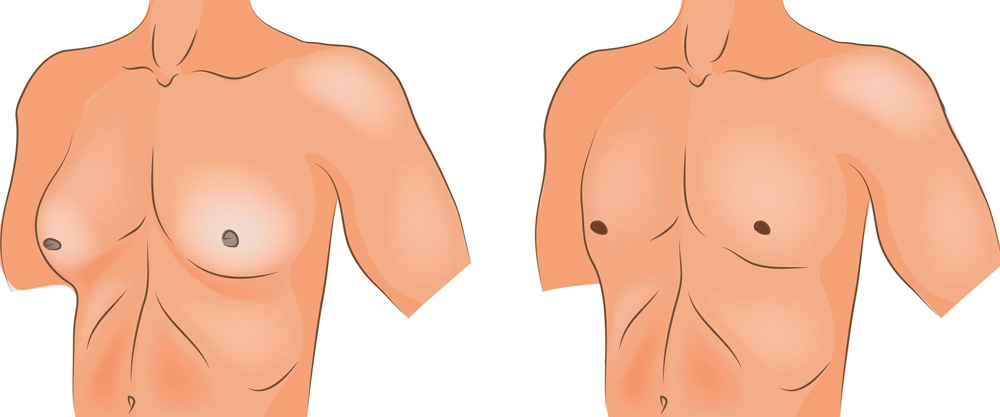
Ginecomastia

What is gynecomastia?
Gynecomastia (sometimes spelled gynaecomastia) is a swelling of the breast tissue in boys and men, and can often be called ‘man boobs’. It can affect just one or both breasts.
Gynecomastia is very common — more than half of all boys develop the condition during puberty, and it normally disappears as they grow older. About 1 in 3 older men will develop it. However, if gynecomastia is causing you a lot of embarrassment, it can be treated with medicines or plastic surgery.
What are the symptoms of gynecomastia?
Gynecomastia causes enlarged breasts that feel rubbery or firm. The swelling spreads from underneath the nipple outwards over the breast area. It can sometimes be quite tender. Gynecomastia can cause the breasts to sag and stretch the areola (the dark skin surrounding the nipple).
It is different from enlarged male breasts caused by being overweight. These are due to excess fat in the breasts.
It is also different from male breast cancer, which is usually on just one side, not always around the nipple, and feels hard or firm.
Usually gynecomastia is not serious, although it could indicate another underlying medical condition – and many men find the condition embarrassing and difficult to cope with.
What causes gynaecomastia?
Gynecomastia is often caused by a natural imbalance between the hormones oestrogen and testosterone, especially after birth, during puberty and as a man gets older
Gynaecomastia can also be caused by medicines that affect hormones. These include anabolic steroids, heart medicines, antibiotics, chemotherapy medicines and some medicines used to treat depression, high blood pressure, stomach ulcers and prostate cancer. Marijuana and alcohol can also cause enlarged breast tissue.
Your doctor can advise you about whether stopping taking a medicine might help with gynecomastia, but never stop taking a medicine without medical advice.
Other causes of gynecomastia include rare genetic conditions such as Klinefelter syndrome, kidney or liver disease, or tumours in the testicles or adrenal gland. Sometimes it is caused when the body has too much of the hormone prolactin, made in the pituitary gland. This can happen due to a tumour, taking antipsychotic or anti-nausea medications, having an underactive thyroid, kidney or liver failure, or from using marijuana.
How is gynecomastia treated?
Gynecomastia often goes away by itself. This can take about 6 months to 2 years. If it is being caused by medicines, stopping the medicine will improve the gynecomastia. If it is caused by an underlying medical condition, treating that condition may lead to an improvement.
If the gynecomastia is painful or causing you a lot of embarrassment, other treatments are available. There are several medicines that have been shown to reduce breast size in men, but they do not work for everyone.
Another option is breast reduction surgery to remove fatty tissue from the breast or to remove the breast gland tissue.
You will need to ask your doctor for a referral to a plastic surgeon, who will assess whether surgery can help you. It may not work well in people who are overweight. Surgery may leave small scars around the areolae.
In the case of boys, it is best to wait until they have stopped developing before considering surgery.